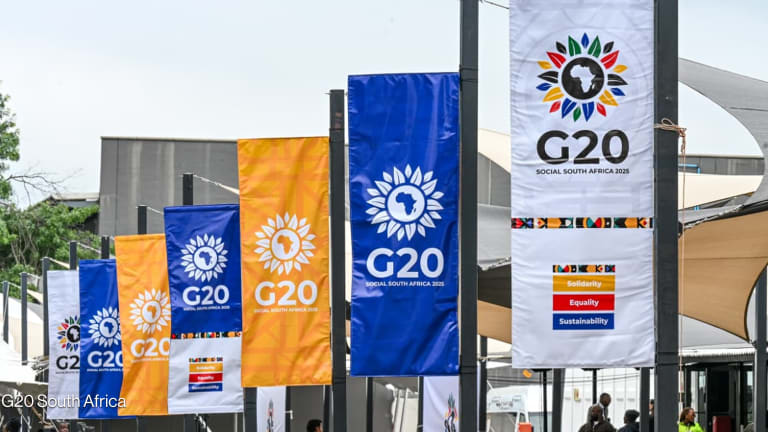
Government officials, business and NGO leaders and a host of others gathered last week in Durban to discuss the economic future of Africa, focusing on how growth can be fostered and more equitably spread. Against a backdrop of slowing economic growth, rising food insecurity and a demographic shift, debate centered around youth, jobs, governance, inequality and education.
Africa’s youth population is expected to double by 2035 to more than 830 million, leaving a huge gap between the number of young people entering the workforce and jobs created to absorb them. Already today, only 3 million formal jobs are created each year while 10 to 12 million youth enter the workforce.
Businesses and governments spoke of working together, at scale, to build the environments and make the investments that will lead to more employment opportunities. The could mean everything from regional trade agreements to large scale infrastructure investments to improving education and agriculture.
See more stories from the World Economic Forum on Africa in Durban:
► Gates Foundation: Africa can tackle inequality via its own research
► Tackling the problems of fragile states in Africa
► Boosting agriculture could mitigate African famine threat in a warming world
► South African environment minister shares lessons on how to create blue economies
► African leadership and priorities debated in opening of WEF Africa
While everyone agreed on the importance of economic growth, unequal growth has contributed to many of today’s challenges, not least in this year’s host country South Africa, which is among the top five most unequal countries in the world.
Discussions throughout the three-day summit were often underlined by a call to act urgently, though it is unclear if talk at WEF Africa will lead to action, a criticism levied during the event. Fewer heads of state and high-level government officials attended compared to previous years, and some veteran attendees told Devex this year’s event fell a bit flat. Still, the forum saw greater civil society participation and better engagement between civil society and the private sector, one NGO leader told Devex.
Governance and growth
Tackling inequality will require government action and leadership, speakers throughout the summit emphasized. They did so with heads of state, including Zimbabwe’s President Robert Mugabe, South Africa’s President Jacob Zuma and Uganda’s President Yoweri Museveni in attendance. Mugabe and Museveni have been in office for 30 and 31 years, respectively, while Zuma has faced intense criticism for numerous scandals for misusing government funds and questionable decision-making throughout his presidency.
That juxtaposition was not lost on the audience, both in person and online. Zimbabweans on Twitter reacted fiercely after Mugabe, sitting on a panel about fragile states, declared that his country was one of the most developed in Africa.
Winnie Byanyima, the CEO of Oxfam International, who was a chair of the event and an outspoken voice throughout the conference, didn’t pass up the opportunity to call out some of the leaders directly.
“You have people with power in the capital who rule us because they have the radio and the guns but have no legitimacy, because they don’t have empowered people and empowered communities,” she said in a plenary session, seated next to Mugabe. Responsible leadership, she said, means retiring and leaving office to give others an opportunity to lead.
Educating the future
Yet other challenges require more than just government leadership. Education, for example, is increasingly leaning on the private sector for support and innovation. A report released at WEF found that nearly one in five children in Africa goes to a private school. That represents an investment opportunity for businesses, as well as a challenge to policymakers to work with private schools as a regulator or even a funder.
In Liberia, Education Minister George Werner described his country’s experiment in bringing in private institutions to help run public schools through the Partnership Schools for Liberia program. He told Devex he felt he had to try the new approach, rather than waiting decades for Liberia’s decimated education system to be revived. “I believe if we do nothing it is a crime against humanity,” he said.
Discussions exposed a tension between advocates focusing on ensuring basic education access and others who would like to see the emphasis placed on skills training to ensure youth have employable skills in demand from companies.
What is clear, however, is that small, one-off initiatives probably won’t be enough. Business and government need to find what works and scale it rapidly. Several job initiatives are underway: the African Development Bank aims to create 25 million jobs and impact 50 million youth by 2025 through its Jobs for Youth in Africa strategy. McKinsey runs a skills training program in five countries globally, including Kenya, focused on matching participants with jobs and training them accordingly.
“There is too much focus on training, not just putting people in jobs,” said Acha Leke, a senior partner in McKinsey’s Johannesburg office, during a press conference at WEF Africa. She argued that education and training programs are often not effectively linked to private sector demands.
Leapfrogging challenges
The need for skills and education also presents an opportunity, several people said during the conference: it allows systems to be designed with the digital economy in mind, leapfrogging directly into the high-tech economy.
Innovation will require better networks and more local capacity among entrepreneurs and scientists, according to several speakers. “If you look at history, innovation around the world doesn’t happen in isolated places,” said Rodger Voorhies, the executive director of global development at the Bill & Melinda Gates Foundation, during a discussion at WEF Africa.
The Gates Foundation and the Wellcome Trust sought to raise awareness for a new initiative bringing together philanthropists, governments and academics — the Coalition for African Research and Innovation — which will aim to improve research capacity, boost investment, enable career pathways for scientists and help countries meet the African Union target of spending 1 percent of gross domestic product on research and development.
Food production is one area ripe for innovation on the continent. The famine in South Sudan and near famines in northern Nigeria and Somalia were mentioned throughout the conference.
Yet while research and planning could help — particularly in Somalia where a drought has fueled the conditions — famine is often an outward manifestation of failed political leadership, several speakers said.
Action ahead?
WEF Africa was a somber meeting, the challenges looming large over discussions. Despite a push to elicit specific recommendations from panelists, discussions may result in little action. Relatively few concrete, specific proposals or commitments emerged at the conference, though perhaps they will in the months ahead.
At this moment of great urgency, however, there isn’t time to waste. A year from now leaders shouldn’t be gathered discussing the same issues, Nachilala Nkombo, the interim Africa executive director for the ONE Campaign, said at a press conference.
“As African stakeholders we can sit and wait for crisis … or we can take a proactive role to ensure action” she said. “We cannot treat the demographic transition as business as usual.”
Catch up on Devex’s coverage of the World Economic Forum on Africa and subscribe to The Development Newswire to receive the latest from the world’s leading donors and decision-makers — emailed to you free every business day.








